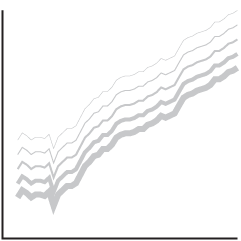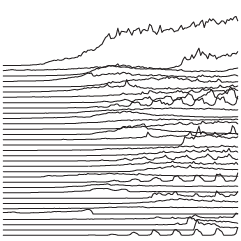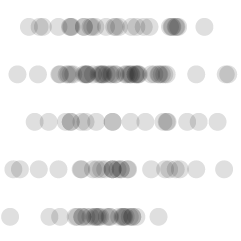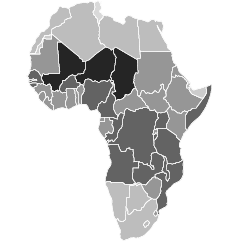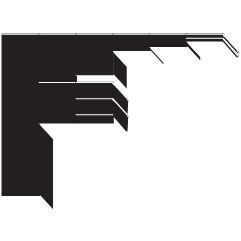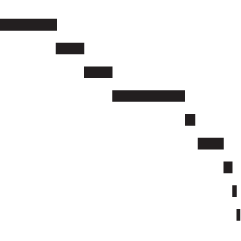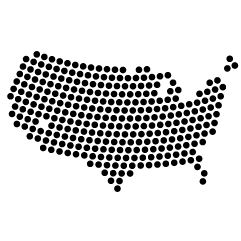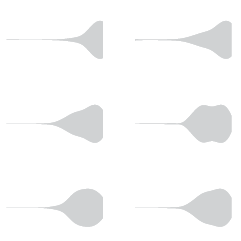Using a computational model called Estimating the Circulation and Climate of the Ocean, Phase II (ECCO2), the NASA Goddard Space Flight Center Scientific Visualization Studio (I think NASA has a thing for long names.) visualizes surface currents around the world. This is beautiful science here. Make sure you turn on high-def and go full screen. [via @aaronkoblin]
-
-
-
Jon Bruner of Forbes, in collaboration with Hilary Mason and Anna Smith of Bitly, maps the most popular news source by state.
Bitly’s dataset, wrangled by data scientists Hilary Mason and Anna Smith, consists of every click on every Bitly link on the Web. Bitly makes its data available publicly—just add ‘+’ to the end of any Bitly link to see how many clicks it’s gotten. For Bitly’s collaboration with Forbes, Smith and Mason looked for news sources and individual articles that were unusually popular in certain states compared to national averages. The interactive map starts by showing which news source dominates in each state by this measure: the Washington Post in Virginia and Maryland, the Chicago Tribune in Illinois, and so on.
You can also select news sources to their click distributions across the country.
I like how The Onion leads in Minnesota, Wisconsin, and New Mexico, although I’d be interested to know what other news sources the states read. A color scale might be informative, too.
-
-
Just choose the location you want via the Google Maps interface, pick what materials you want, and Woodcut Maps puts your map through the laser cutter and assembles and packs your map by hand. Great gift idea or a nice little something to set on your desk.
-
-
-
-
Designer Matt Dempsey explains the storyline of Inception in this fun experiment. There were a few flowcharts that came out when the movie did, including one from Christopher Nolan, but this one takes the cake. Just keep on scrolling down to move through levels, and people (the colored circles) disappear and reappear as people go in and out of dreams and limbo.
-
Adam Savage of Mythbusters gives a short talk on simple ideas leading to complex findings. Good. “Just thought a little bit harder” and “were a bit more curious.”
-
-
-
-
Essentially, all models are wrong, but some are useful.
— George E. P. Box, Empirical Model-Building and Response Surfaces, 1987A favorite quote among statisticians.
-
Whoa. What did I just read?
I think most of you know of Freakonomics, but in case you don’t, it started as a book in 2005, by economist Steven Levitt and journalist Stephen Dubner. The book examines corners of life (like cheating in sumo) through data. It’s a good read. SuperFreakonomics was the follow-up in 2009. Freakonomics has since grown up into a media company, complete with documentary, radio show, and blog. Needless to say, it’s had a lot of success.
In the latest issue of American Scientist, statisticians Kaiser Fung and Andrew Gelman wrote a strong critique of Levitt and Dubner’s work.
In our analysis of the Freakonomics approach, we encountered a range of avoidable mistakes, from back-of-the-envelope analyses gone wrong to unexamined assumptions to an uncritical reliance on the work of Levitt’s friends and colleagues. This turns accessibility on its head: Readers must work to discern which conclusions are fully quantitative, which are somewhat data driven and which are purely speculative.
Fung and Gelman then cite examples that they believe erroneous.
It’s not mean-spirited, but Gelman has a way of offending even if he doesn’t mean to, so I knew a third of the way through that this could not end well.
Dubner replied. (Skip part II, which addresses a different issue that shouldn’t have been an issue in the first place.) He assesses — after explaining why almost everything that Fung and Gelman wrote is wrong — that they were blinded by their want to disprove.
[O]nce they’d picked up a hammer, did everything look like a nail?
Dubner continues:
I can certainly understand why Freakonomics is an appealing target for someone like Gelman-Fung. As I noted earlier, there are strong incentives to attack, particularly in the public sphere, where one can get a ton of attention in a blink by assailing the reputation of someone who’s been plugging away for years. Whether in the academy, the media, the political arena, or elsewhere, public discourse these days often seems little more than a tit-for-tat game in which you wait for someone or something to achieve a certain momentum and then shout as loudly as you can that it’s “wrong!” Or, in written form: Epic fail.
I’ve only read the first book, which like I said was really good, so I can’t really go with either side, but Dubner provides some compelling arguments, and I have a feeling most people will believe him more.
Update: Gelman replies to the reply and Fung adds to that.
-
-
A couple of years ago, when you thought about online interactive maps, what came to your mind? Lots of yellow. Online maps are looking a lot different these days though, and Stamen Design has played a big role in making that happen. In their most recently released project, they offer three tile sets to use with OpenStreetMap data, and they look really good.
All three are something to see, but the watercolor tiles will knock your socks off. They’re computer-generated, but they look hand-drawn by a skilled artist slash cartographer (which is really what the Stamen folks are).
-
-
For the MIT Sloan Sports Analytics Conference a few weeks ago, Stanford biomechanical engineering student and Ayasdi analyst Muthu Alagappan presented his work on redefining basketball positions.
After studying players like LeBron James and Blake Griffin, many analysts are now suggesting that there are new positions, which are simply hybrids of the one’s we already had. For example, some players are now labeled “point-forwards” or “combo-guards.” But what if we were wrong about our initial five positions. Maybe a “Center” is just a label for people over a certain height, and there are actually three different types of big men in the NBA.
An analysis, done with data exploration tool Ayasdi Iris, provided 13 possible positions, as shown above. Nodes and edges are colored by points per minute on a blue (low) to red (high) scale.
So for example, those typically classified as centers or power forwards are classified as scoring rebounders, paint protectors, and scoring paint protectors. Dirk Nowitzki might be considered a scoring rebounder, whereas Joakim Noah is a paint protector.
The point? Hopefully teams can use this information to make better decisions about who to trade and draft. Of course, I’m sure scouts know about these fuzzy positions already, so I think the next step is to look at what positions the best teams have and had, and more importantly, how a “one-of-a-kind” player can change everything.


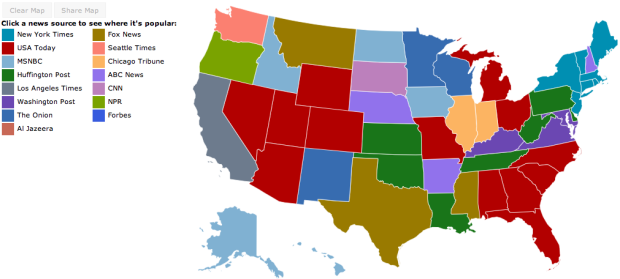

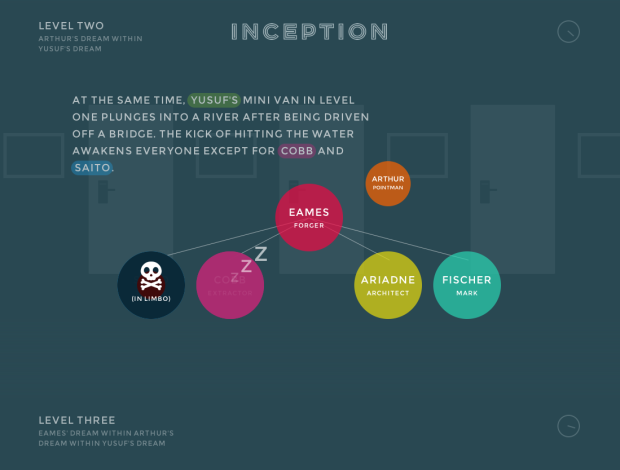
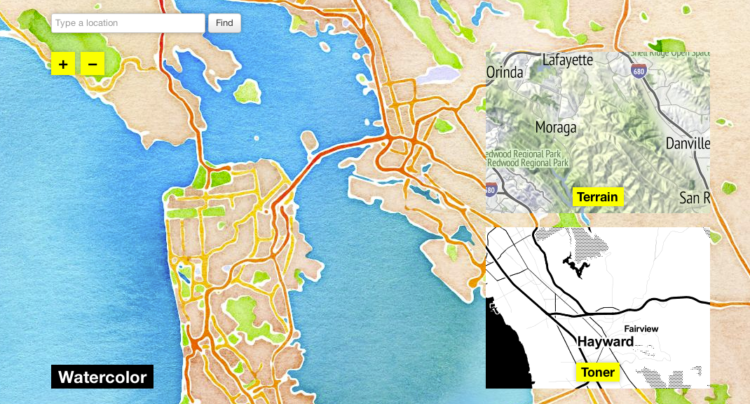
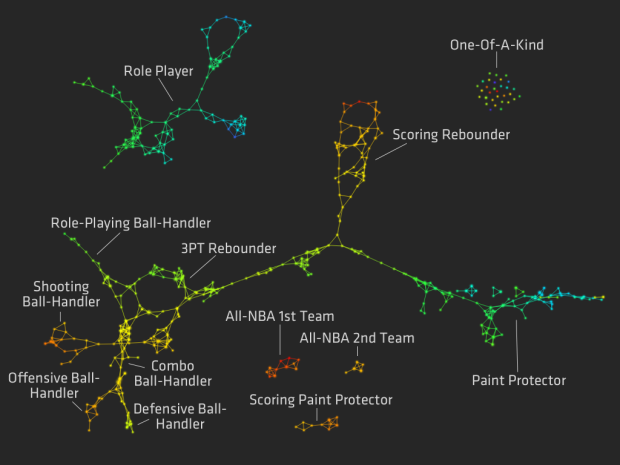
 Visualize This: The FlowingData Guide to Design, Visualization, and Statistics (2nd Edition)
Visualize This: The FlowingData Guide to Design, Visualization, and Statistics (2nd Edition)
